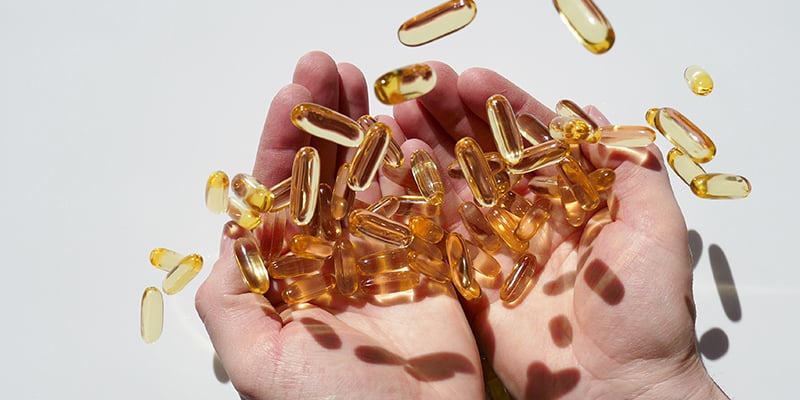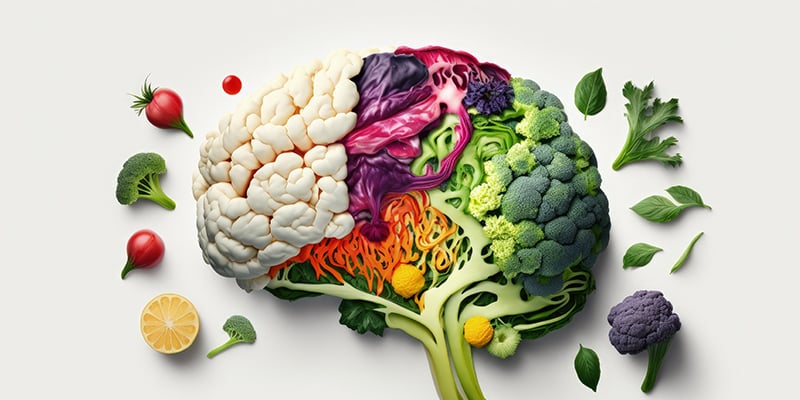
Omega-3 fatty acids are some of the most widely known and well-researched nutraceuticals on the market. There are good reasons why. Omega-3s are critically important to overall health and well-being. Scientific evidence shows they can improve brain function, memory, blood flow, and mood. Omega-3s can also reduce brain shrinkage from aging and inflammation. What many people don’t know is that there are 2 active compounds in omega-3s: EPA (eicosapentaenoic acid) and DHA (docosahexaenoic acid). You need both.
But what’s the difference between EPA and DHA?
What many people don’t know is that there are 2 active compounds in omega-3s: EPA (eicosapentaenoic acid) and DHA (docosahexaenoic acid). You need both. Click To TweetWHAT IS EPA?
EPA is an omega-3 fatty acid that is known primarily for its anti-inflammatory effects, which can have many benefits for the brain and body. A 2019 meta-analysis in the Journal of the American Heart Association points to supplementation with omega-3 EPA and DHA as protective for heart health. A 2021 systematic review and meta-analysis in The Lancet found that supplementation with EPA alone provided a greater reduction of risk compared with a combination of EPA and DHA. Other research from 2021 found that treatment with both EPA and DHA led to greater improvement in cognitive function in people with heart disease.
WHAT IS DHA?
DHA is an omega-3 fatty acid that is a vital component of cell membranes and an important building block in the brain. Critical for healthy brain development in the womb and in newborns, DHA continues to play a critical role in maintaining brain function throughout the lifespan. This important substance promotes fluidity of brain cell membranes, and it could influence the way we think and feel. DHA is so important to brain function, that some experts call it “brain food.”
A 2017 review paper points to many benefits of oral supplementation with DHA, including enhanced neurogenesis and improved memory. The paper also analyzed animal studies showing that rats that were DHA deficient had symptoms of depression, anxiety, and memory problems.
DO YOU HAVE LOW LEVELS OF OMEGA-3 EPA AND DHA?
Unfortunately, most Americans are low in omega-3 fatty acids. In 2016, Amen Clinics tested the omega-3 fatty acids levels of 50 consecutive patients who were not taking fish oil (the most commonly used source of EPA and DHA) and found that 49 had suboptimal levels.
Having low levels of the omega-3 fatty acids EPA and DHA in your bloodstream is associated with inflammation. It’s also one of the leading preventable causes of death, according to researchers at the Harvard School of Public Health. Low levels of EPA and DHA are also linked to:
- Depression and bipolar disorder
- Suicidal behavior
- ADD/ADHD
- Cognitive impairment and dementia
- Obesity
- Heart disease
In another study at Amen Clinics, the research team correlated the brain SPECT imaging scans of 130 patients with their EPA and DHA levels. SPECT is an imaging technology that measures blood flow and activity in the brain. The scans found that individuals with the lowest levels of EPA and DHA had lower blood flow in the brain, including in regions involved in memory. On SPECT, low blood flow is the #1 brain imaging predictor that a person will develop Alzheimer’s disease. On cognitive testing, low omega-3 levels also correlated with lower mood scores.
How can you test your omega-3 level? The Omega-3 Index is a test that involves a single drop of blood to measure the total amount of omega-3 fatty acids EPA and DHA in red blood cells. This directly reflects the levels of EPA and DHA in the brain.
HOW TO GET ADEQUATE OMEGA-3 EPA AND DHA
The human body has a very limited capacity to produce EPA and DHA, so you must get these substances from foods or supplements. Unfortunately, the Standard American Diet (SAD) provides a far greater abundance of omega-6 fatty acids and a scarcity of omega-3s. Some research suggests that the ratio of omega-6 to omega-3 has skyrocketed from 1:1 during evolutionary times to a whopping 20:1, or even higher, today. Consuming too many omega-6s has been associated with inflammation, obesity, and other health issues.
The best dietary sources of omega-3 EPA and DHA are cold-water fish, such as salmon, sardines, or herring. However, some fish are high in mercury and other toxins. Because of this, highly concentrated, high-quality fish oil supplements are a healthy alternative to getting the omega-3 EPA and DHA needed. Look for products that provide 1,000-3,000 mg of EPA and DHA.
CAN VEGETARIANS AND VEGANS GET ENOUGH OMEGA-3 EPA AND DHA?
For vegetarians and vegans, it can be an even greater challenge to get enough omega-3 fatty acids through diet. Plants make a type of omega-3 fatty acid called alpha-linolenic acid (ALA), which is found in foods like flaxseeds, walnuts, and chia seeds. The human body can convert ALA into EPA and DHA, but it isn’t very efficient.
As far as supplements go, compared to fish oil-based omega-3 products, most vegan omega-3 fatty acid products on the market have very low levels of omega-3 DHA and virtually no omega-3 EPA. BrainMD recently introduced Vegan Omega-3 Power, a formula that supplies clinically effective doses of EPA and DHA.
BENEFITS OF SUPPLEMENTATION WITH OMEGA-3 EPA AND DHA
Decades of scientific evidence reveal that supplementation with omega-3 fatty acids EPA and DHA offers a wealth of benefits. For example, a 20-year study with over 3,000 participants found that individuals—especially women—with the greatest intake of EPA and DHA were less likely to experience depression symptoms.
Research shows that other benefits associated with omega-3 EPA and DHA include increased attention in people with ADD/ADHD. A study in Archives of General Psychiatry showed a reduced risk for psychosis. They can also be helpful for children with behavioral problems. At Amen Clinics, when a group of retired football players were treated with highly concentrated fish oil supplements, many of them were able to decrease or completely eliminate their pain medications.
Mood, memory, ADD/ADHD, and other mental health and brain health issues can’t wait. At Amen Clinics, we’re here for you. We offer in-clinic brain scanning and appointments, as well as mental telehealth, clinical evaluations, and therapy for adults, teens, children, and couples. Find out more by speaking to a specialist today at 888-288-9834 or visit our contact page here.





So detailed and helpful. Thank you for sharing this research. God bless you.
Comment by Jean — September 14, 2022 @ 10:40 AM
very helpful article!
Comment by Douglas Morris — July 19, 2023 @ 4:38 PM
Overall a good and informative piece
One thing i might add: The fish do not make theïr own EPA and DHA. your very informative piece does not mention that it is algae that synthesize this, and that the fish eat the algae..Also many people also MDs do not know this, which is quite understandable.
There are quite a few algae supplements on the market now with DHA and EPA, true many significantly (much?) lower in DHA and EPA than many fishoils, but then again fishoils do come with their own issues too, pcb's mercury etc. . "Bio accumulation" is a real thing and if the fishoils are rancid then they are not healthy too. How many people store them in fridge? The tiny fatty fish from Baltic sea are not allowed for human consumption, but they are fine (?) as fishfeed for the salmon in aquaculture in scandinavia. Thats mainly an EU issue yes, but still. The krill from arctic areas seems better, but is quite expensive and often also low dosed. I don' t know whats best. Keep on critically thinking yourselves you all and again Amen clinics….thanks for the info!
Comment by simon v D — August 26, 2023 @ 2:58 PM